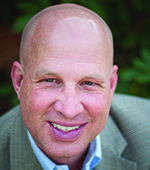 By John Chandler
By John Chandler
About 25 years ago, a wise and slightly-bored retiree friend told me that he was about to start a new business venture: self-storage units. He had done extensive research on American habits and thought he was onto a trend. Turned out he was oh-so-right, and has made a tidy profit by getting in on the front edge of what has become an established industry.
Now we are entering the age where even our storage units are full, and a new trend (and business opportunity) awaits. Peter Walsh is a “professional organizer,” who, for a fee will help you “tame the clutter” and “have a vision for your home or office.” As a bonus, he often claims that those who do “often slim down themselves, too.” His book, Lose the Clutter, Lose the Weight, has a simple premise: “People getting on top of the clutter in their homes get on top of other issues in their lives as well.” Walsh’s six-week plan consists of a decluttering plan, an exercise routine, a nutrition regimen and a mindfulness component.
Most interesting are his four primary types of clutter:
 Lazy clutter: The mail or laundry that piles up because you haven’t thought it important to deal with it at the moment.
Lazy clutter: The mail or laundry that piles up because you haven’t thought it important to deal with it at the moment.
Memory clutter: What we hold onto that reminds us of important people or events from the past.
Malignant clutter: A subset of memory clutter that represents a painful time in your life.
“I might need it one day” clutter: The stuff we hold onto “just in case.”
I couldn’t help but imagine going through many of the churches I am in and categorizing the types of clutter in them.
Walsh is selling how much you will save if you declutter your life: not throwing away expired food because your pantry’s a mess, not paying late fees because your bills aren’t organized, and lowering your stress by reducing loss and inefficiency. It’s no newsflash that Americans have way too much stuff and are way too stressed. What’s newsworthy is that we are becoming desperate enough to pay someone to tell us how to throw things away.
I predict a trend that highly effective churches in the near future will capitalize on decluttering life and soul. Already we’ve seen resonance with “Simple Church.” As my friend Mike Breen often says, “Christianity is simple but hard; we make it complicated and easy.” The churches that will be most effective at speaking of the well-fitting yoke of Jesus going forward will be the ones that help people live uncluttered lives that help them do simple, hard Kingdom things.
